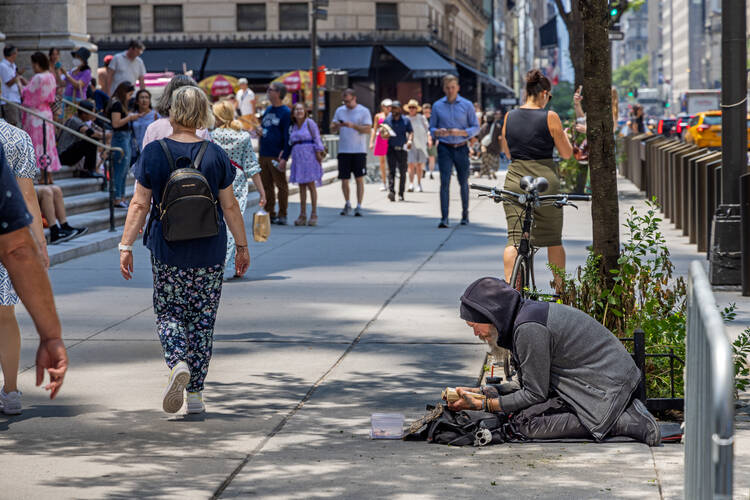Update: On June 28, the U.S. Supreme Court upheld the Grants Pass, Ore., law banning homeless residents from sleeping outdoors, saying that such laws do not violate the Constitution’s prohibition on cruel and unusual punishment.
What if it were a criminal offense to have no place to call home?
Last month, the U.S. Supreme Court heard arguments on whether state and local authorities can prosecute homeless or unhoused individuals for violating laws against sleeping outside, setting up tents in public places or residing in their vehicles. The case at hand comes from the city of Grants Pass, Ore., where enforcement of anti-camping laws was curtailed in 2018 by the Ninth Circuit Court, which ruled that such laws violate the stricture against “cruel and unusual punishment” in the Eighth Amendment of the U.S. Constitution. The city of Grants Pass is asking the Supreme Court to overrule the lower court, and municipalities across the country are bracing themselves for a decision, expected by the end of June, that will affect how local governments are allowed to tackle homelessness.
I work for a small nonprofit organization, one of hundreds in New York City that seeks to support individuals and families experiencing food and housing insecurity. Every day I encounter people who are navigating the city shelter system or are living on the street—sometimes of their own volition and sometimes for reasons very much out of their control. The stories I hear run the gamut, and if I have learned anything in my years of working with unhoused and housing-insecure individuals, it is that nothing is ever black-and-white.
I also acknowledge that New York’s struggles with homelessness are different from those in places like Grants Pass or even large cities like Seattle. By and large, we do not have massive “tent cities” in our public parks or more permanent informal settlements like that of Skid Row in Los Angeles. Like a statewide law in Massachusetts, we have a “right to shelter” law in the city that guarantees a safe and suitable place to sleep off the streets for anyone who needs it, something that advocates in other cities have been urging their communities to consider for many years. (Note: There have been recent addendums made to this law as it pertains to migrants and asylum-seekers, as housing sites have been filled beyond capacity and the city has struggled to meet its promise to offer shelter, however temporary, to all.)
The law is not a perfect solution. It has helped reduce the number of individuals sleeping outside on the streets, especially during winter, but homelessness is still endemic here in the Big Apple. It may seem to blend into our city canvas differently than in other places, with people often pushed further into the margins and further into invisibility. But in that sense, homelessness is actually the same everywhere in the United States: We are all guilty of a collective willingness to relegate people to living invisible lives in public, choosing to see them only when they begin to inconvenience our own creature comforts and privileges. Organizations like mine are challenging the phenomenon of the faceless, unhoused person and asking all of us to recognize those who have gone unseen.
We know from the Gospels that we do not just see with our eyes. True seeing comes from knowing and understanding individual stories that can transform our hearts and heighten our ability to authentically acknowledge those we might have othered or overlooked. Only when we are able to truly see, hear and come to a greater understanding of those living their lives on the margins can we attempt to offer any semblance of help to them. And as we listen to each story of the unhoused, we come to see that there is no blanket law or solution, including the best-intentioned right-to-shelter policies, that can address the multitude of issues that drive people into homelessness on a daily basis.
There is the war veteran who cannot stay in the shelter in which he has been placed because the noise triggers his PTSD; he chooses to sleep outside, near his methadone clinic, so as not to miss his next appointment. There is the former professional musician who struggles to keep his bipolar disorder under control; he chooses to spend most nights sleeping on subway cars between busking sessions. There is the migrant family whose 30-day shelter allowance has expired, so their only option is to sleep on the sidewalk outside the shelter-hotel that just evicted them while the city reassesses their asylum application. There is the woman who needs to collect and deposit recyclable bottles to make ends meet, scheduling at least a couple of nights on the street per month in order to gather as many items as possible.
These are just a few examples of the hundreds of stories we encounter each day, and each one makes me ask how we as a society could ever come up with the idea of criminalizing homelessness. This approach is no easier than trying to prosecute every instance of injustice, as the intersections of every -ism in the book drive how people become housing-insecure in the first place.
How can you punish people who have little, or nothing, more to lose? How do you issue a fine if it is just a laughable piece of paper, or arrest someone when a night in jail might just be a welcome respite from the outdoors?
Instead of creating legislation to create more criminal offenses that do less than put a butterfly stitch on a gaping wound, we can redirect our efforts (and our tax dollars) toward humanizing those who are experiencing homelessness. It is not impossible to lower or even completely eliminate (one can dream!) the rising rates of homelessness and housing insecurity in our communities. But this goal requires that we stop relegating people to the sidelines of our society and commit ourselves to no longer allowing people to become invisible in public.








